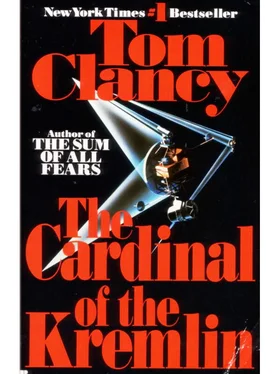Tom Clancy - The Cardinal of the Kremlin
Здесь есть возможность читать онлайн «Tom Clancy - The Cardinal of the Kremlin» весь текст электронной книги совершенно бесплатно (целиком полную версию без сокращений). В некоторых случаях можно слушать аудио, скачать через торрент в формате fb2 и присутствует краткое содержание. Год выпуска: 1988, Жанр: Триллер, на английском языке. Описание произведения, (предисловие) а так же отзывы посетителей доступны на портале библиотеки ЛибКат.
- Название:The Cardinal of the Kremlin
- Автор:
- Жанр:
- Год:1988
- ISBN:нет данных
- Рейтинг книги:3 / 5. Голосов: 1
-
Избранное:Добавить в избранное
- Отзывы:
-
Ваша оценка:
- 60
- 1
- 2
- 3
- 4
- 5
The Cardinal of the Kremlin: краткое содержание, описание и аннотация
Предлагаем к чтению аннотацию, описание, краткое содержание или предисловие (зависит от того, что написал сам автор книги «The Cardinal of the Kremlin»). Если вы не нашли необходимую информацию о книге — напишите в комментариях, мы постараемся отыскать её.
The Cardinal of the Kremlin — читать онлайн бесплатно полную книгу (весь текст) целиком
Ниже представлен текст книги, разбитый по страницам. Система сохранения места последней прочитанной страницы, позволяет с удобством читать онлайн бесплатно книгу «The Cardinal of the Kremlin», без необходимости каждый раз заново искать на чём Вы остановились. Поставьте закладку, и сможете в любой момент перейти на страницу, на которой закончили чтение.
Интервал:
Закладка:
The Russian turned back abruptly. Something had alerted him, and he knew that something was wrong before he'd had time to wonder why. He watched the sergeant's arm come up in a rapid underhand movement toward his friend's throat. The Soviet Captain dove for his rifle as the Lieutenant threw himself backward to avoid the first lunge. He succeeded only because the sergeant's knife caught in the overly long sleeve of his tunic. Cursing, he freed it and lunged forward, slashing his target across the abdomen. The Lieutenant screamed, but managed to grab the sergeant's wrist before the knife reached his vital organs. The faces of the two men were close enough that each could smell the other's breath. One face was too shocked to be afraid, the other too angry. In the end, the Lieutenant's life was saved by the cloth of an ill-fitting tunic sleeve, as the Soviet flipped the safety off his rifle and fired ten rounds into the assassin's side. The sergeant fell without a sound. The Lieutenant held a bloody hand to his eyes. The Captain shouted the alarm.
The distinctive metallic chatter of the Kalashnikov rifle carried the four hundred meters to where the mudjaheddin waited. The same thought rippled through everyone's mind: the plan had been blown. Unfortunately, there was no planned alternative. To their left, the positions of Three Company were suddenly alight with the flashes of gunfire. They were firing at nothing – there were no guerrillas there – but the noise could not help but alert the Russian positions three hundred meters ahead. The chieftain ordered his men forward anyway, supported by nearly two hundred Afghan Army troops for whom the change of side had come as a relief. The additional men did not make as much of a difference as one might expect. These new mudjaheddin had no heavy weapons other than a few crew-served machine guns, and the chieftain's single mortar was slow setting up.
The Archer cursed as he watched lights go off at the airfield, three kilometers away. They were replaced with the wiggling dots of flashlights as flight crews raced to their aircraft. A moment later parachute flares began turning night to day. The harsh southeast wind blew them rapidly away, but more kept appearing. There was nothing he could do but activate his launcher. He could see the helicopters… and the single An-26 transport. With his left hand the Archer lifted his binoculars and saw the twin-engine, high-wing aircraft sitting there like a sleeping bird in an unprotected nest. A number of people were running to it as well. He turned his glasses back to the helicopter area.
An Mi-24 helicopter lifted off first, struggling with the thin air and howling wind to gain altitude, as mortar rounds began to drop within the airfield perimeter. A phosphorus round fell within a few meters of another Hind, its searing white flash igniting the Mi-24's fuel, and the crew leaped out, one of them aflame. They'd barely gotten clear when the aircraft exploded, taking a second Hind with it. The last one lifted off a moment later, rocking backward and disappearing into the black night, its flying lights off. They'd both be back – the Archer was sure of that – but they'd gotten two on the ground, and that was better than he'd expected.
Everything else, he saw, was going badly. Mortar rounds were falling in front of the assault troops. He saw flashes of guns and explosives. Above the noises came the other sound of the battlefield: the battle cries of warriors and the screams of the wounded. At this distance it was hard to distinguish Russian from Afghan. But that was not his concern.
The Archer didn't need to tell Abdul to scan the sky for the helicopters. He tried using the missile launcher to search for the invisible heat of their engines. He found nothing, and returned his eyes to the one aircraft he could still see. There were mortar rounds falling near the An-26 now, but the flight crew already had the engines turning. In a moment he saw some lateral movement. The Archer gauged the wind and decided that the aircraft would try coming into the wind, then flare left over the safest portion of the perimeter. It would not be easy to climb in this thin air, and when the pilot turned, he'd rob his wings of lift in the quest for speed. The Archer tapped Abdul on the shoulder and began running to the left. He made it a hundred meters when he stopped and looked again for the Soviet transport. It was moving now, through the black showers of dirt, bouncing across the frozen, uneven ground as it accelerated.
The Archer stood to give the missile a better look at the target, and immediately the seeker chirped on finding the hot engines against the cold, moonless night.
"V-One," the copilot shouted over the noise of battle and engines. His eyes were locked on the instruments while the pilot fought to hold the aircraft straight. "V-R – rotate! "
The pilot eased back on the yoke. The nose came up, and the An-26 took a final bounce off the hard dirt strip. The copilot instantly retracted the landing gear to reduce drag, allowing the plane to speed up that much quicker. The pilot brought the aircraft into a gentle right turn to avoid what seemed to be the heaviest concentration of ground fire. Once clear, he'd come back to the north for Kabul and safety. Behind him, the navigator wasn't looking at his charts. Rather, he was deploying parachute flares every five seconds. These were not to help the troops on the ground, though they did have that effect. They were to fool ground-launched missiles. The manual said to deploy one every five seconds.
The Archer timed the flares carefully. He could hear the change in the seeker's tone when they fell clear of the aircraft's cargo hatch and ignited. He needed to lock on to the plane's left-side engine and to time his shot carefully if he wanted to hit his target. In his mind he had already measured the point of closest approach – about nine hundred meters – and just before reaching it, the aircraft ejected another flare. A second later, the seeker returned to its normal acquisition tone, and he squeezed the trigger.
As always, it was almost a sexual release when the launcher tube bucked in his hands. The sounds of battle around him vanished as he concentrated on the speeding dot of yellow flame.
The navigator had just released another flare when the Stinger impacted on the left-side engine. His first thought was one of outrage – the manual was wrong! The flight engineer had no such thoughts. Automatically, he punched the "emergency-kill" switch to the number-one turbine. That shut down the fuel flow, cut off all electrical power, feathered the propeller, and activated the fire extinguisher. The pilot pushed the rudder pedal to compensate for left yaw induced by the loss of portside power and pushed the nose down. That was a dangerous call, but he had to measure speed against altitude, and he decided that he needed speed most of all. The engineer reported that the left-side fuel tank was punctured, but it was only a hundred kilometers to Kabul. What came next was worse:
"Fire warning light on number one!"
"Pull the bottle!"
"Already done! Everything's off."
The pilot resisted the temptation to look around. He was only a hundred meters above the ground now, and couldn't allow anything to interfere with his concentration. His peripheral vision caught a flash of yellow-orange flame, but he shut it out. His eyes went from the horizon to his airspeed and altimeter and back again.
"Losing altitude," the copilot reported.
"Ten degrees more flaps," the pilot ordered. He reckoned that he had enough speed now to risk it. The copilot reached down to deploy them ten degrees farther, and so doomed the aircraft and its passengers.
The missile explosion had damaged the hydraulic lines to the left-side flaps. The increased pressure needed to change the setting ruptured both the lines, and the flaps on the left wing retracted without warning. The loss of left-lift nearly snap-rolled the aircraft, but the pilot caught it and leveled out. Too many things were going wrong at once. The aircraft started sinking, and the pilot screamed for more power, knowing that the right-side engine was already firewalled. He prayed that getting into the ground effect might save his bird, but just holding her straight was nearly impossible, and he realized that they were sinking too fast in the thin air. He had to put her down. At the last moment the pilot switched on his landing lights to find a flat spot. He saw only a field of rocks, and used his last vestige of control to aim his falling bird between the two biggest. A second before the aircraft hit the ground he snarled a curse, not a cry of despair, but one of rage.
Читать дальшеИнтервал:
Закладка:
Похожие книги на «The Cardinal of the Kremlin»
Представляем Вашему вниманию похожие книги на «The Cardinal of the Kremlin» списком для выбора. Мы отобрали схожую по названию и смыслу литературу в надежде предоставить читателям больше вариантов отыскать новые, интересные, ещё непрочитанные произведения.
Обсуждение, отзывы о книге «The Cardinal of the Kremlin» и просто собственные мнения читателей. Оставьте ваши комментарии, напишите, что Вы думаете о произведении, его смысле или главных героях. Укажите что конкретно понравилось, а что нет, и почему Вы так считаете.






![Александр Ирвин - Tom Clancy’s The Division 2. Фальшивый рассвет [litres]](/books/417744/aleksandr-irvin-tom-clancy-s-the-division-2-falsh-thumb.webp)





